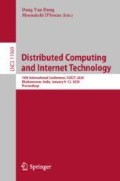Abstract
Computer Science often emulates humanlike behaviours including intelligence that has taken to storms in every other domain where human deals with. A computing system with a defined role and goal is called an agent with humanlike capability for decision making in dynamic and complex real world it is situated in. Largely this aspect of a computing unit needs ability to learn, act and forecast. Broadly the study in Artificial Intelligence (AI) also deals with such aspects. Researchers of both the schools of computing viz. Intelligent Agents and AI systems, propose several algorithms to emulate human like behaviours. These algorithms here, are labelled as anthropomorphic algorithms. In particular, here our discussion is focussed on trust. The idea of trust as conceptualised, computed and applied in different domains, is discussed. Further, it points out the dimensions that need to be looked at, in order to endow computing systems with trust as a humanitics.
Access this chapter
Tax calculation will be finalised at checkout
Purchases are for personal use only
References
Zahedi, A., Parma, F.: An energy-aware trust-based routing algorithm using gravitational search approach in wireless sensor networks. Peer-to-Peer Netw. Appl. 12(1), 67–176 (2009)
Rao, A.S., Georgeff, M.: Modelling rational agents within BDI architecture. In: Proceedings of Second International Conference on Knowledge Representation and Reasoning, San Mateo, CA (1991)
Ashtiani, M., Azgomi, M.A.: A novel trust evolution algorithm based on a quantum-like model of computational trust. Cogn. Technol. works 21, 1–24 (2018)
Castelfranch, C., Falcone, R., Pezzulo, G.: Trust in information sources as a source for trust: a fuzzy approach. In: Proceedings of AAMAS, pp. 89–96 (2003)
Kossinets, G., Kleinberg, J., Watts, D.: The structure of information pathways in a social communication network. In: Proceedings of ACM SIGKDD, pp. 435–443 (2008)
Golbeck, J.A.: Computing and Applying Trust in Web-Based Social Networks. Ph.D. dissertation, College Park, MD, USA, University of Maryland at College Park (2005)
Granovetter, M.: The strength of weak ties: a network theory revisited. Sociol. Theory 1, 201–233 (1983)
Mohanty, H., Prasad, K., Shyamasundar, R.K.: Trust assessment in web services: an extension to jUDDI. In: Proceedings IEEE e-Business Engineering, pp. 759–762 (2007)
An architectural blueprint for autonomic computing, IBM White Paper (2006)
Jiang, W., Wang, G., Wu, J.: Generating trusted graphs for trust evaluation in online social networks. Future Gener. Comput. Syst. 31, 48–58 (2014)
Jiang, W., Wu, J., Li, F., Wang, G., Zheng, H.: Trust evaluation in online social networks using generalized network flow. IEEE Trans. Comput. 65(3), 952–963 (2016)
Kinny, D., Georgeff, M., Rao, A.: A methodology and modelling technique for systems of BDI agents. In: Van de Velde, W., Perram, J.W. (eds.) MAAMAW 1996. LNCS, vol. 1038, pp. 56–71. Springer, Heidelberg (1996). https://doi.org/10.1007/BFb0031846
Aslan, M., Sen, S.: Evolving trust formula to evaluate data trustworthiness in VANETs using genetic programming. In: Kaufmann, P., Castillo, P.A. (eds.) EvoApplications 2019. LNCS, vol. 11454, pp. 413–429. Springer, Cham (2019). https://doi.org/10.1007/978-3-030-16692-2_28
Mao, M., Zhang, G., Zhang, J.: Multirelational social recommendations via multigraph ranking. IEEE Trans. Cybern. 47(12), 4049–4061 (2017)
Georgeff, M., Pell, B., Pollack, M., Tambe, M., Wooldridge, M.: The belief-desire-intention model of agency. In: Müller, J.P., Rao, A.S., Singh, M.P. (eds.) ATAL 1998. LNCS, vol. 1555, pp. 1–10. Springer, Heidelberg (1999). https://doi.org/10.1007/3-540-49057-4_1
Taherian, M., Amini, M., Jalili, R.: Trust inference in web-based social networks using resistive networks. In: Proceedings ICIW, pp. 233–238 (2008)
Newell, A.: Unified Theories of Cognition. Harvard University Press, Cambridge (1990)
Balakrishnan, R., Kambhampati, S.: SourceRank: relevance and trust assessment for deep web sources based on inter-source agreement. In: Proceedings of WWW, vol. 1, pp. 227–236 (2011)
Cohen, R., Schaekermann, M., Liu, S., Cormier, M.: Trusted AI and the contribution of trust modeling in multiagent system. In: Proceedings of AAMAS, pp. 1644–1648 (2019)
Hamdi, S., Gancarski, A.L., Bouzeghoub, A., Yahia, A.B.: TISON: trust inference in trust-oriented social networks. ACM Trans. Inf. Syst. 34(3), 17 (2016)
Schnettler, S.: A structured overview of 50 years of small-world research. Soc. Netw. 31(3), 165–178 (2009)
Chen, S., Wang, G., Jia, W.: k-FuzzyTrust: efficient trust computation for large-scale mobile social networks using a fuzzy implicit social graph. Inf. Sci. 318, 123–143 (2015)
Laird, J.E.: The Soar Cognitive Architecture. MIT Press, Cambridge (2012). ISBN 978-0262122962
Laird, J.E., Newell, A., Rosenbloom, P.S.: SOAR: an architecture for general intelligence. Artif. Intell. 33, 1–64 (1987)
Malkhi, D., Reiter, M.K.: Byzantine quorum systems. Distrib. Comput. 11(4), 203–213 (1998)
Alagar, V.S., Paquet, J., Wan, K.: Intensional programming for agent communication. In: Leite, J., Omicini, A., Torroni, P., Yolum, I. (eds.) DALT 2004. LNCS (LNAI), vol. 3476, pp. 239–255. Springer, Heidelberg (2005). https://doi.org/10.1007/11493402_14
Mao, C., Xu, C., He, Q.: A cost-effective algorithm for inferring the trust between two individuals in social networks. Knowl.-Based Syst. 164, 122–138 (2019)
Guha, R., Kumar, R., Raghavan, P., Tomkins, A.: Propagation of trust and distrust. In: Proceedings of WWW, pp. 403–412 (2004)
Ruan, Y., Durresi, A.: A survey of trust management systems for online social communities-trust modelling, trust inference and attacks. Knowl.-Based Syst. 106, 150–163 (2016)
Author information
Authors and Affiliations
Corresponding author
Editor information
Editors and Affiliations
Rights and permissions
Copyright information
© 2020 Springer Nature Switzerland AG
About this paper
Cite this paper
Mohanty, H. (2020). Trust: Anthropomorphic Algorithmic. In: Hung, D., D´Souza, M. (eds) Distributed Computing and Internet Technology. ICDCIT 2020. Lecture Notes in Computer Science(), vol 11969. Springer, Cham. https://doi.org/10.1007/978-3-030-36987-3_4
Download citation
DOI: https://doi.org/10.1007/978-3-030-36987-3_4
Published:
Publisher Name: Springer, Cham
Print ISBN: 978-3-030-36986-6
Online ISBN: 978-3-030-36987-3
eBook Packages: Computer ScienceComputer Science (R0)

